The Evidence Says Yes.
“There is no religion higher than truth.” Helena P. Blavatsky
“Let us not seek the Republican answer or the Democratic answer, but the right answer.” John F. Kennedy
These pictures of John F. Kennedy and H. P. Blavatsky bear a haunting resemblance. Look first at the eyes. Even more than the similarity of the physical images of the eyes is the look of them both has a haunting correspondence. Also note the shape of the face, the nose, mouth and ears are very similar.
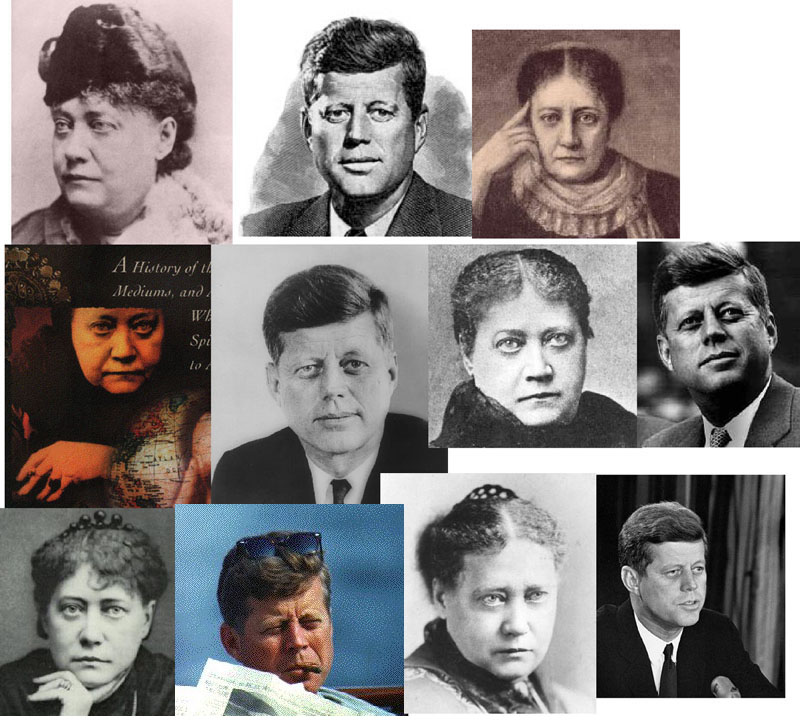
These above pictures provide interesting food for thought but do not provide enough proof to convince the the sincere seeker. The real seeker will want something more concrete. In this rare case we have the something more. We have something as concrete as the fingerprints of these two entities. We have their handwriting.
The Handwriting Says Yes!
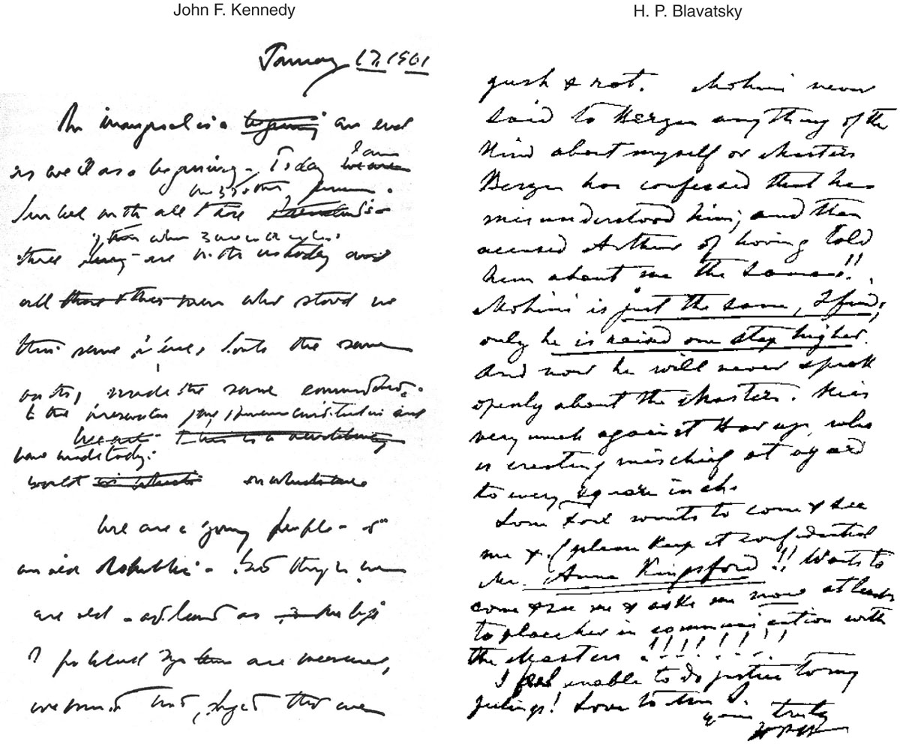
The above sample of Kennedy’s writing is a draft of his inaugural address in 1961. Below is another sample of Kenedy’s writing from about 20 years earlier. Note that there are as many superficial difference between the two Kennedy samples as there is between the two above samples of the two entities.
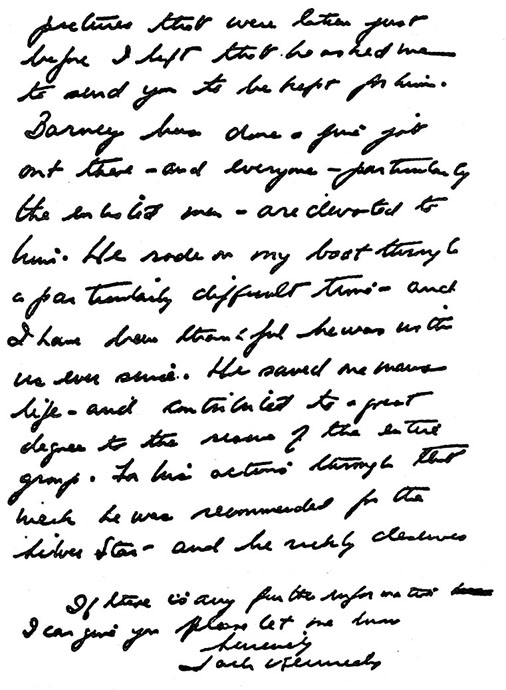
Even though the pictures provide an interesting clue it was the handwriting of the two who clued me in. A friend gave me a web address containing H. P. Blavatsky;s handwriting. Up to this point I had only seen her signature, but when I finally got a chance to see a page of her writing I thought to myself: “There’s something familiar about this handwriting. It seems that I have seen it before.”
Having forty years experience with hand writing analysis, I rarely forget a script. I reflected a few moments and then it hit me. It seemed that the handwriting of Ms. Blavatsky was very similar to that of JFK.
I immediately retrieved several samples of the late President’s handwriting and made comparisons. As I compared the two side by side I could immediately see why Blavatsky’s writing had a familiar ring. They were very close indeed close enough to make a powerful case that H. P. Blavatsky reincarnated as John F. Kennedy and became President of the United States.
It is interesting that many students of past lives believe that JFK was Abraham Lincoln in a past life because of the many synchronicities between the lives and associations of the two men. I never believed this, however. The reason is that I compared the handwriting of these two and concluded the differences were too basic for them both to be the same entity, even if we take into consideration that there will be some changes from life to life. Since there are changes in handwriting and personality from decade to decade within a single life it is only logical that there would be changes from life to life.
But the question is this: What would change from life to life and what would stay the same?
That which would change would be personality characteristics, cultural attitudes, the tendency toward being an introvert or extrovert and other more superficial things.
That which would remain similar would be related to intelligence. The intelligence would rarely be less as we progress from life to life, but would increase.
The intensity of feeling would also be quite similar as well as the emotional response though emotional response does vary with time, especially if the person faces a trauma of some kind.
That said, take a look to the two handwriting samples and follow me in comparing them.
The most impressive thing to note is the basic intelligence manifested between the two not only brain intelligence, but also emotional intelligence. When we look at the whole picture of the speed of thought, the perception, the passion, the ability to simplify, the aggressiveness etc we see here the handwriting of two of the most intelligent individuals in our history.
JFK is a little more intelligent overall than HPB but this is to be expected if the two are the same entity with JFK having a few years of extra learning under his belt.
Now let us itemize the similarities.
THE SIMILARITIES
Emotional Response
The easiest thing for the layman to see in the handwriting is the general slant. If one makes even a cursory look at the samples above he can see that the slant is very similar. This reveals the general outward emotional makeup.
More subtle and not so easily seen by the layman are the upstrokes in m’s, n’s and other letters which reveal the more inner emotional makeup.
These strokes revealing this inner makeup are also very similar.
Emotional Intensity
This is revealed by the pressure of the writing. Heavier pressure is usually revealed by heavier strokes, but since these samples were created with different pens and we do not have the originals it takes the skill of experience to make a judgment here. In my judgment the pressure is very similar. As evidence of this even the untrained eye can look at the samples and surmise that all of them were written with great intensity and higher than normal pressure applied to the pen.
Now we will examine more closely some other interesting similarities of the handwriting between the two entities. We could belabor this by going through them all one by one, but we will limit our investigation to the more unusual characteristics not found in most handwriting samples.
If, for instance we pinpoint two strokes found in common to 50% of all handwriting that does not present us with much proof, but if we present two items found only on one handwriting out of 100 then we have something. Then if we present two such characteristics we have an increased probability of 100X100 or one chance in 10,000 for the two showing up.
In the next section we will present enough similarities to increase the chances to over a million to one that H. P. Blavatsky and JFK are the same person.
The Handwriting Says Yes!
First let us examine the similarities of words that are common to both handwritings. Since I have limited samples of each I was only able to pull a few exact word matches, but this is enough to be impressive indeed. They are more similar than one would expect even if it were a known fact that the two are the same entity separated by 60-80 years of time and circumstance.
WORD MATCHES

SPACE GAPS WITHIN A WORD
One of the most significant similarities between the writings are the gaps within individual words. These two also have short breaks with similar regularity within various words. This is fairly common and shows an intuitive nature, but these larger gaps are fairly rare, especially among the very intelligent.
Such gaps reveal a disconnected thinking that breaks somewhat from reality and is often found among those with low intelligence, drug users or someone physically ill. We know that JFK took an enormous amount of drugs throughout his life and was also plagued with painful illness which he attempted to mask.
Correspondingly, H. P. Blavatsky also suffered from painful illness. It is quite possible that she took some strong medications for them but I do not have any data on this. It is on record that she smoked up to 200 cigarettes a day and this by itself would inject an enormous amount of nicotine in the system.
Even so, neither illness or the use of drugs provides the full explanation. The reason is this. Most people who are ill or use drugs will have a half dozen signs of it show up in the writing. The handwriting of these two entities reveal a very powerful vitality, intelligence, clear thinking and strength, except for this one characteristic. This tells us that both of these individuals exercised the power of tremendous will to divorce themselves from their physical maladies to live life as if they were healthy, vital personalities.
This leads me to draw an unorthodox analysis of the gaps for both entities. I think the gaps would be there for both of them with or without ill health or drug use. While ill health or drug use may make the gaps more pronounced I think the cause is related more to a virtue than a vice.
I believe that both of them contemplated the abstract/spiritual world in his own way and periodically divorced themselves from orthodox thinking and reality as wee know it in the search for answers. The gaps thus show a disconnect, but an intelligent disconnect that added to their creativity.
Whatever the case, such gaps are not at all common among the super intelligent and are rare in this writing combination. Take a look. The first gap in the word “ask” is particularly synchronous.
JFK . . . . . . . . . HPB
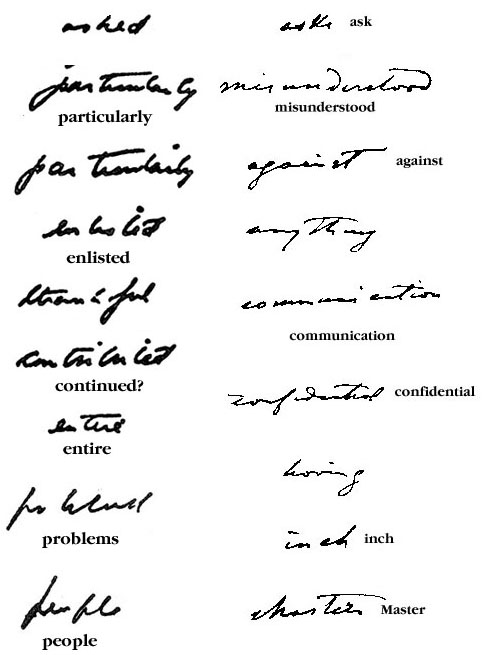
CONSISTENCY IN THE LOWER ZONE
One thing that amateur forgerers do not realize is that the handwriting expert will detect him by too much consistency. When people write they do not sign their names exactly the same each time. Neither do they cross their T’s or dot their I’s in exactly the same place. All of us vary our handwriting as we vary our moods. One thing we look for in finding a handwriting match is a similar amount of variance between any two scripts.
There is an amazing amount of consistency in both small and large gaps in the handwriting of Kennedy and Blavatsky, but how about other factors?
Let us now examine the lower zone of the two handwritings. In this area there is usually some variance, but not like that expressed by Kennedy and Blavatsky. Note that within the variety of the strokes still exists a hauntingly close correspondence.
Again, note the first one which is vary rare consists of two strokes. Maybe one out of a 1000 handwritings would have this oddity.
JFK . . . . . . . . . HPB
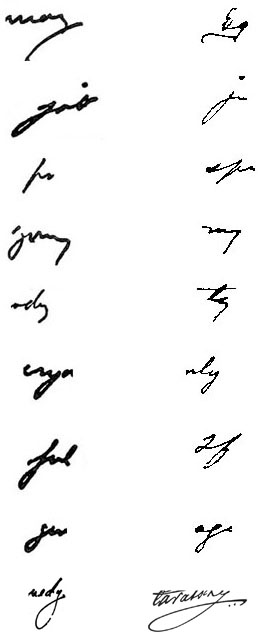
THE T CROSS
Another interesting trait revealed is the T cross. The layman may think that there could be only a couple variables in this, but they are mistaken. There are hundreds of ways to cross a T.
Among them are:
- The location of the cross on the stem varying from low to above the stem.
- Does the cross ascend, descend or go straight from left to right?
- Is the pressure heavy or light?
- Is it long or short?
- Does it create an arc?
- Is the arc convex or concave?
- Does the stroke increase of decrease on strength?
- Does it go to the left or right of the stem?
Considering the number of variables the chances are very high against the fact that we would have two handwritings matching up like these two.
JFK . . . . . . . . . HPB
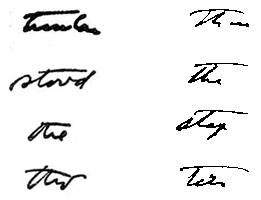
THE BOLD STROKE
An ending stroke that boldly extends shows courage or gutsiness. Again, this is revealed in both scripts.
JFK . . . . . . . . . HPB

THE WAVE
Waves in writing show charm. We know that JFK certainly had this, but so did H. P. Blavatsky. Too bad we do not have her on film so we could have witnessed her personality.
JFK . . . . . . . . . HPB
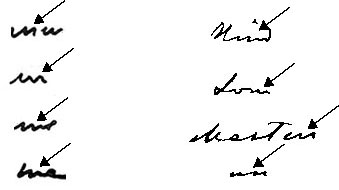
HEAVY DOTS
Both JFK and H. P. B had the odd habit of making extra heavy i-dots or periods every so often and then making dots with regular pressure the rest of the time. Blavatsky used a fountain pen so her strokes are not as thick as JFK’s for that reason.
JFK . . . . . . . . . HPB

MORE ODD DOTS
Note that in the two signatuires below they both placed two dots under their names. This is another oddity showing up in both writings. In the 1963 signature Kennedy was under stress. The 1961 signature shows him at his best. From an analyst’s point of view this is a very beautiful signature.
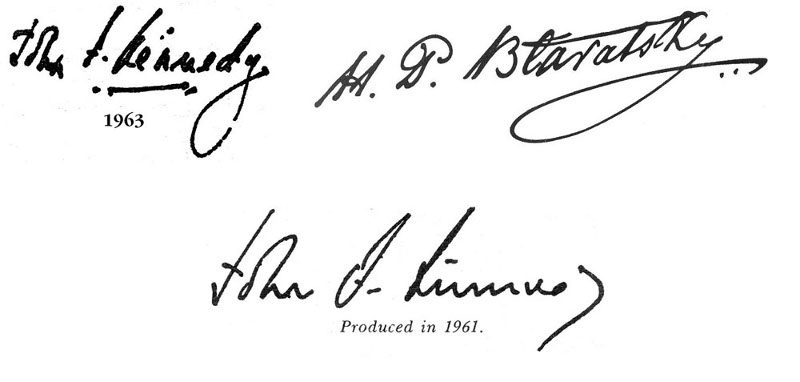
UNDERLINING
Both individuals underlined items as they wrote.
JFK . . . . . . . . . HPB
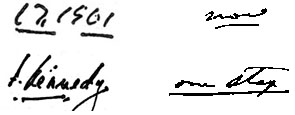
CONCLUSION
I could spend a lot of time going into small details but here are a number of other important similarities.
- The speed of the writing is very similar. They both have a quickness that is shared by less than 1% of the population. The overall intelligence in both handwritings from my analysis is over one out of a million.
- The simplification of the writing is very close, with JFK using the fewer strokes another sign of him being a little ahead in evolution.
- Perception revealed by the points on m’s, n’s are similar. The similarity is closer if we use JFK’s earlier handwriting.
- Both stretch their words out to a similar degree showing them both to be extroverts.
- All three zones of the handwriting are similar. We already illustrated the lower zone as with the Y’s, F’s etc. In addition to this the middle and upper part of the writing is very similar.
- JFK’s intelligence is a little higher than HPB. This would be true if he was H. P. Blavatsky in a later life.
Is anything in the writing different?
Yes, of course. Just as there are differences in Kennedy’s two samples spanning decades even so will there always be differences in the personality and the handwriting in different lifetimes.
Even so, the differences are less pronounced than expected giving us an excellent case proving reincarnation.
The two most obvious differences are:
- The space between the lines of the first two samples. H. P. Blavatsky’s is quite a bit closer together. But then note that the earlier sample from JFK (closer to the HBP lifetime) has his lines with less space between them. This tells us that this characteristic was an evolving trait during the JFK lifetime probably a result from his rising fame which caused him to desire more “space.”
- H. P. Blavatsky’s ending stroke on her D’s had an upward flare that was missing in Kennedy’s writing. This is explained by the fact that many handwritings from the 1800’s had this characteristic. This trend became rare in the next generation. As we progress from life to life we often adopt the strokes that are popular. For instance, during the Hippie era many were dotting their eyes with happy faces. Few would consider doing this today.
Overall, the similarities are amazing and from this analysts’ point of view we have here a proof of identity comparable to fingerprints.
Copyright @copy 2004 by Joseph J. Dewey
Download The Immortal, Book 1, Free as MP3, Text, or PDF
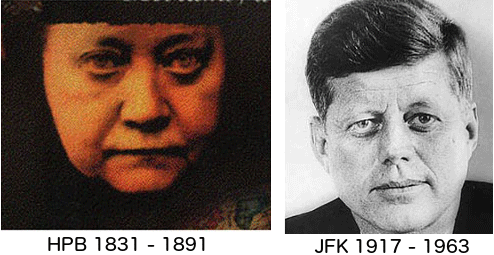

I’m a bit confused: the 1901 letter at the top of this post is dated ten years after Madame Blavatsky’s death and 16 years before Kennedy’s birth. So, it couldn’t have been written by either of them.
The letter was in 1961, not 1901.